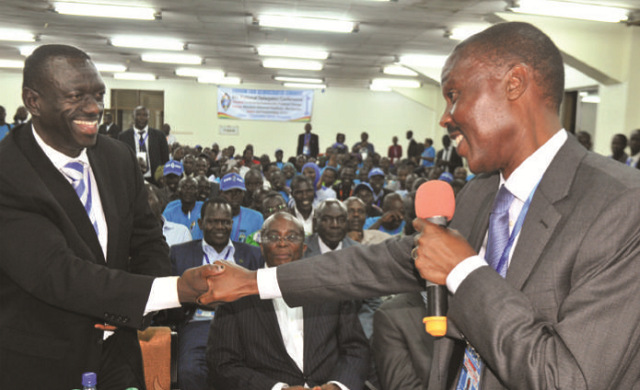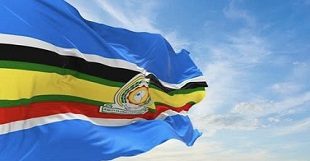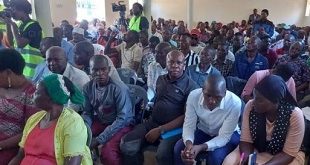
Nandala leaves Besigye
Previously, the party has been divided into two camps—supporters of the party president Gen. Mugisha Muntu and supporters of its former flag bearer Col. Kizza Besigye. But insiders say, another faction has emerged and is paying allegiance to the party Secretary General, Nathan Nandala Mafabi.
Nandala, who used to be very close to Besigye started withdrawing after 2012 when Besigye did not support him or at least openly endorse him in a party presidential contest against Muntu.
Insiders say Nandala, who thought Besigye was nurturing him as a successor is now convinced that the latter wants to stay and continue contesting for Presidency yet he also harbors presidential ambitions and wants to be on the ballot paper in 2021.
The defiance camp has been looking for a candidate to stand for Party President against Muntu and seems to have zeroed down on Kumi legislator, Patrick Amuriat. It is not yet clear whether Nandala will stand. But Muntu supporters are hoping that Nandala stands so that the defiance vote is divided.
“We want to win the Presidency and push them out of our party,” a Muntu supporter told The Independent, “If we don’t win the Presidency we will leave them in their party and form our own.”
The Muntu camp is incensed because they believe that Nandala wanted the party to fail to send a representative to EALA to further discredit Muntu.
Muntu supporters believe he was tricked into fielding two candidates. Realising the error, apparently, he attempted to correct it by sending one member, Ibi, the real winner of the primaries and withdrawing Turinawe. Apparently, both Nandala and Ingrid were in a party meeting that agreed with that position (Turinawe has since denied knowledge of that meeting or that position in the media). But The Independent has seen the minutes of that meeting that agreed on that position.
“We (Muntu supporters) won’t sit and watch the defiance camp destroy our chances of capturing power,” a Muntu supporter vowed, “The defiance camp has no strategy to add on the 2.5 million votes we already have as the opposition. We believe that we can consolidate and add on those votes by winning over the fence sitters and some NRM members.”
The group plans to reach out to the civil servants and the middle class who desire continuity and who think that continuity is threatened by the extremism of Besigye’s group.
“We will either force the defiance group out of the party or form our own party,” the Muntu supporter said, “September will be the turning point for us but I highly doubt that FDC will stay together.”
But the feud is not raging on Whatapp only. Members of the various camps are speaking out openly. A member of Besigye’s defiance camp, Nicholas Atuhairwe says they want Muntu’s supporters – also called the “organisationists” out because they are “destroying the party”.
“They want to keep us in opposition forever,” he told The Independent, “They keep singing organisation in theory when they are not doing any practical work to achieve that organisation. Muntu has been singing organisation since he took over the Presidency in 2012 but up to now, you go on the ground and there is nothing to show for it.”
He says Muntu cannot cause the Museveni regime to fall.
“He is very weak and we who believe in defiance to achieve our goal must first deliver our party from a weak party president,” he told The Independent, “We’re already looking for a candidate who will take on Muntu and defeat him. We will sit as a group and choose one candidate to run against him. After that we will eliminate them from the party and move smoothly ahead with our plans.”
On EALA, Atuhaire says there was an agreed party position of sending two candidates, which was frustrated by Muntu and his group. He said the Muntu camp wanted to follow the demands of NRM of fielding one candidate the reason Muntu authored a letter withdrawing Turinawe arbitrarily.
“We cannot accept that dictatorship,” he said, “If he wants to give orders he should go back in the army.”
The FDC Leap Forward Whatsapp group is where members from both sides attack each other. Each side accuses the other of selling out to Museveni.
The Muntu group accuses the Besigye group of deliberately giving away their victory in February 2016. They say Besigye was compromised by the regime. The Besigye group also accuses Muntu of being a mole and refusing to announce the results tallied by the party on February 19.
The group administrators who seem to be from Muntu’s camp keep removing members of the defiance camp for being abusive while some of the members from both groups leave voluntarily because of endless accusations and counter accusations.
 The Independent Uganda: You get the Truth we Pay the Price
The Independent Uganda: You get the Truth we Pay the Price



Is the FDC disintegrating? Some have made the fore conclusion, that Yes, it is. It will be very unfortunate if that were to be true. Unfortunate in the sense that the said “break-up” is based on a brawl from a “Whatsapp” account but more important, that the FDC is the only credible alternative to the NRM. The FDC is the largest political party in the opposition, both in terms of Parliamentary representation and popular vote. The FDC poses an image of an all inclusive Uganda which focuses away from tribe or religious affiliations. The FDC does not suffer from historical nostalgia of “we fought” so, “we own this thing.” In recent history, the FDC eclipses any other political party, as the only party that has managed to have representation in Parliament from the five regions (North, East, Central and West) even when it is in opposition. In all modesty, the FDC has registered a stellar performance, given the prevailing political temptations. What then should we be reading in the struggles that seem to be tearing up the FDC? Fear. Unfounded fear (emphasis mine.)
The glue that formed the FDC was that, NRM is a one man party or that it was owned by a “clique.” There have been growing concerns over the years that by Besigye not leaving the grandstand in FDC, he’s no less evil than NRM’s Museveni. Some have gone on to say that the reason why the FDC does not grow its voter base and go on to win Presidential elections, is due to the limitations of Dr. Besigye. They say that Dr. Besigye has radicalised the party, failed to set up structural systems and simply adapted to electioneering tactics. They accuse Besigye of being aggressive, intolerant and sometimes they accuse him of his fierce and scary face. They accuse him of so many things including having a hoarse voice. (Politics is an unforgiving field.) These are the issues (accusations) that seem to be rocking the FDC. But let me impugn and give “alternative facts” to these accusations. The FDC was formerly established in 2004. Dr. Kiiza Besigye was elected as its first President while in exile. On his return, in 2006, he contested for President garnering 38% of the total vote. In 2009, he contested for the Party President where he trounced General Muntu. Despite his overwhelming support within the party, he resigned in 2012, paving way for Mugisha Muntu. It should be noted, that Muntu’s converging issues during the 2009 party presidential campaigns were; to build the party from the grassroots and his ability to fundraise for the party on a grand scale. The 2012 party elections provided him the opportunity to showcase these abilities. But as fate would have it, at the 2015, delegates conference, Muntu’s actions were put to a litmus test. He contested as the party’s presidential nominee against Besigye. He lost. For three years of “fundraising and building party structures at the grassroots”, Mugisha Muntu couldn’t beat Kiiza Besigye.
Fast forward into the 2016, general elections. Dr. Besigye was nominated on 4th November, 2015. The voting was slated to take place on 18th February, 2016. He had, at most, four months to campaign. Irrespective of the fact that voters in Dr. Besigye’s stronghold (Kampala and Wakiso) were disenfranchised, he garnered close to 3million votes- eating into Museveni’s supposed vote of close to 500,000 votes. The implicit meaning in this is that, if Gen. Muntu’s tactics couldn’t translate into victory even within the party, how then, will he be able to overturn things at the national level? If Besigye can obtain 3million votes within four months, how then, do we account FDC’s failures on his persona?
My impression is that, some members within the FDC suffer from a “historical baggage” and “cowardice.” Some members are remnants of the old parties, particularly UPC and NRM and so they want to impress a connexion from UPC and NRM to FDC. They see Obote and Museveni’s political evolution in Besigye. But it should be clear to them, that as Obote and Museveni evolved so did their respective political parties. Besigye could be evolving but he is not evolving with the FDC. Besigye is not tempering with the party constitution, he’s not “ring fencing” any office. There is a shared view across the political divide, that FDC carries out fairly free, open and transparent elections. If the problem is with Besigye, why don’t these members redress their frustrations through the party structural mechanisms? The FDC members who are frustrated with Besigye need not more than 751 of the delegates vote to dash out any of Besigye’s hopes from the party. They can either choose to cap the number of times a candidate can run for a particular office, or, declare Besigye’s actions, deeds and intentions “anti-party.” If they feel they can’t contend with this prospect of convincing 751 people, then they are the problem and not Besigye. The problem
facing the FDC is more psychological than real.
loading….